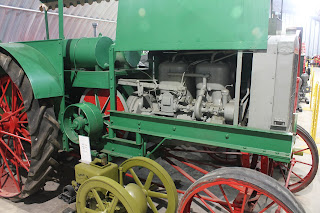Mr. and Mrs. John Heider from central Illinois stopped by recently and asked if we happened to have a Heider tractor in our museum. They previously had thee Heider tractors, along with a number of other brands in their personal collection. John was very knowledgeable about Heider, and was impressed that the one in our collection had the fringe around the canopy and appears to have the original canopy roof. They happened to have the same last name as the founders of Heider Manufacturing, but were not related.
The Heider Manufacturing Company was formed by Henry J. Heider and his brother, John, after Henry's business of manufacturing four-horse eveners outgrew his ability to manufacture eveners and run his farm. They moved from Albert Lea, Minnesota to Caroll, Iowa as the business expanded, and incorporated the company to finance the new concrete block factory in Caroll in 1904. They continued to manufacture four and six-horse eveners, yokes, double and single trees.
Henry became interested in tractors around 1907, and developed a prototype similar to the Moline Universal Tractor. In 1910 they decided to go with a four-wheel design for tractor with a friction drive. Twenty-five Heider model A's were made between March, 1911 and 1912. The Heider B was introduced in 1912, switching to the model C in 1915.
The model B was rated at 10 hp on the drawbar, and 20 on the belt.
The early model C 12-20 was produced from 1916 to 1924, and was rated at 9 hp drawbar and 16 belt. It was powered by a 429 ci (7.0L) Waukesha 4-cylinder engine, with a 4.5 inch bore and 6.75 inch stroke.
The Heider C 15-27 was manufactured from 1924-1927, and had 15 drawbar and 27 belt horsepower. It was powered by a Waukesha 4-cylinder engine with a 4.75 inch bore and 6.75 inch stroke.
The Heider tractors used a friction drive system with a wood fiber drive surface on the engine flywheel which drove one of two cast discs set at a right angle to the flywheel. Engaging the flywheel with one side drove the tractor forward, and moving the cast discs to the other direction engaged the opposite side disc and drove the tractor in reverse. The system gave seven speeds of both forward or reverse by sliding the entire engine forward or backward with a notched lever to engage different portions of the cast drive discs.
Henry Heider was also given patents for a mechanical plow lift in 1917. The lift consisted of a ratchet gear assembly driven from the rear tractor wheels. Pressing a pedal engaged a clutch on the rear axle drive to cause a lift arm to lift the tractor mounted plow out of the ground. Pressing the pedal a second time dropped the plow back into plowing position.
The Heiders sold the tractor portion of the manufacturing business to The Rock Island Plow Company in 1916 because the popularity of the Heider C required a manufacturing facility with more capacity. Tractor manufacturing was moved to Rock Island Illinois. Henry Heider's engineering services were retained by Rock Island until 1922.
Heider manufacturing continued to make wooden products of its pre-tractor business and later made wagons and auger wagons. Henry also held a patent for a coaster wagon. In 1983 the business was sold to the Welllbuilt Company of Scranton, Iowa.
For more information on the Heider company, visit: http://heidertractors.com/




No comments:
Post a Comment